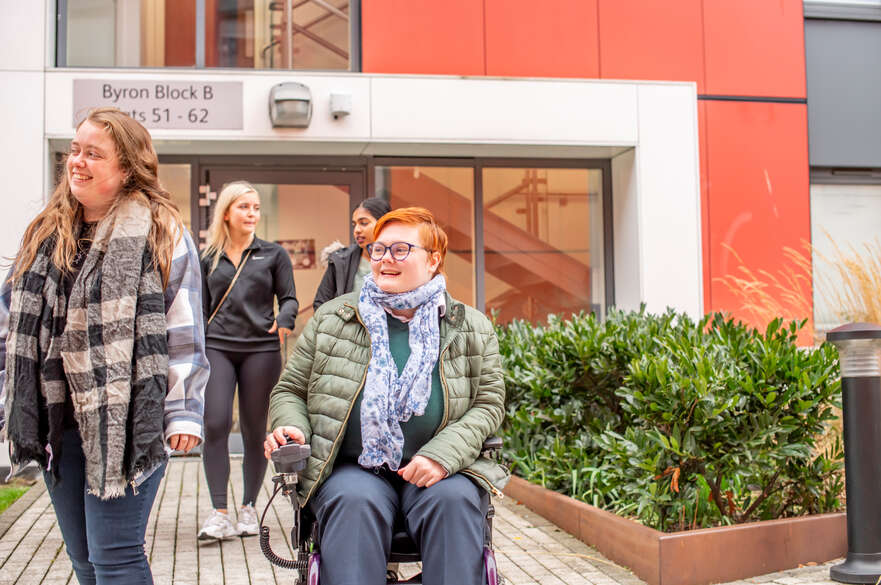Preparing for student life
Starting university can be a bit of a culture shock, but we’re here to help you to settle in. Here are some things to keep in mind:
- We encourage you to tell us about your particular needs when you apply. You can do this by filling in our applicant information form. This helps us to make the right arrangements for you and provide the best possible support, so that your experience at NTU is a positive one.
- Apply for a Disabled Students' Allowance (DSA) if you have: autism; physical, sensory, mental health and long-term medical conditions; and dyslexia or other specific learning differences (SpLD).
If you're already a student studying with us you can complete our support and wellbeing referral form to tell us about your support needs.
Support tailored to your needs
Autism and AuDHD support
Find out about support, regular events and activities, and more for students with autism at NTU.
Dyslexia and SpLD support
Our Dyslexia Support team provides advice and support to students with specific learning difficulties (SpLDs), such as dyslexia and dyspraxia.
Mental health support
If you have a mental health condition that affects your studies, we offer a range of services to support your time at university.
Physical, sensory and long-term medical conditions
Our Disability Support team can offer advice for both current and prospective students on the types of support available.
ADHD support
Find out about support, regular events and activities, and more for students with ADHD at NTU.
Book an advice session
Browse our diversity and inclusion services and book an advice session.
Olivia shares her experience of NTU's disability support.
Disabled Student Commitment
NTU is one of 15 institutions to sign up to the Disabled Student Commitment.
Launched by Advance HE and created following consultation with students and colleagues from across the sector, the Disabled Student Commitment encourages universities to consider the entire journey of disabled students and the steps they can take to improve their experience.
Funding and adjustments
Disabled Students' Allowance (DSA)
You may be eligible to receive the Disabled Students' Allowance (DSA). This can be used to cover extra costs that might arise during your studies on account of a disability, health or learning condition.
Access Statements
Access statements recommend reasonable adjustments and appropriate support, so that your studies aren’t disadvantaged by a disability, learning difficulty or long-term health condition.
Your Disability Officer

Each School has a dedicated Disability Officer, who’ll support you by liaising with your academic team. They will be your key point of contact while studying at NTU, and can help you to get an Access Statement in place, as well as arranging your support needs.
Advice sessions
We run advice sessions remotely and across all our campuses, where students can talk with their Disability Officer and receive support with things like academic liaison, support arrangements and applying for a Disabled Students Allowance (DSA).
If you want to find out more, please email us.

Accessible accommodation
If you have specific accommodation needs because of a disability or medical requirement, we offer a range of accessible accommodation at our City, Clifton and Brackenhurst campuses.
You can find detailed accessibility information for each of our halls on our Accessibility in Halls page, including guidance on living in halls with a range of access needs, and the adjustments we can make.
Getting around
Campus accessibility
Nottingham Trent University are working with AccessAble to provide detailed access guides to the buildings, services and rooms across our campuses.
The City Campus is on a slight slope, but is fully accessible across our key buildings and facilities.
Clifton Campus is compact and completely self-contained. It slopes gently in places, but is generally accessible. If you need to move between campuses, a low-floor accessible bus service runs between the City and Clifton campuses throughout term time.
Brackenhurst Campus is a rural campus with walkways, but some rough tracks.
NTU Mansfield University Hub is compact. It slopes gently in places, but is generally accessible.
We recommend that you visit us and your campus before starting your course – we’ll be very happy to discuss your access needs.
Assistance dogs
The University recognises that a dog kept and used by a disabled person (as defined by the Equality Act 2010) for the purpose of assisting that person to carry out day-to-day activities (an “Assistance Dog”), will require access to the University’s estate, relevant buildings and University-owned student accommodation.
Assistance dogs are trained by members of Assistance Dogs (UK), or by an equivalent organisation in another country. They have formal identification and are permitted to accompany their owners at all times and in all places within the United Kingdom (unless there is a genuine health and safety risk).
If you have an assistance dog, let us know you wish to bring them so we can answer any questions you may have around this.
Parking
Parking at the City Campus is very limited. However, if you are a Blue Badge holder or need to bring your car to the University because of a medical condition, we may be able to provide a dedicated parking space. Parking is not guaranteed, and will be allocated on a first come first served basis. For further information, please email us.
There is Blue Badge parking available at NTU Mansfield University Hub. For further information please email us.
Join our inclusive community
From creating and maintaining environments that enable everyone to flourish, to celebrating Disability History Month, at NTU we’re committed to helping our disabled students to get the most out of university.
Additional support information
Bullying and harassment concerns
Our Dignity and Respect Contacts are specially trained members of staff from across the University, who offer support and an impartial listening service. Call +44 (0)115 848 6529 or email below.
Email the Equality teamHomesickness
The Student Advice Centre can provide support and advice to people experiencing homesickness. Our Chaplaincy also offer pastoral support to students finding it hard to settle in. They can support you regardless of your religious or spiritual beliefs, even if you have none.
Learn more about the Student Advice CentreLoneliness
Nobody should feel like they’re alone at university. If you’re interested in widening your social circle, joining a society or club is a great way to meet people with similar interests. There are over 130 societies currently affiliated to Nottingham Trent Students’ Union (NTSU).
Visit the NTSU websiteOnline self-help
Silvercloud is our online system designed to help with a range of mental health issues. The content is motivational, easy to use, interactive and relevant to students. It can be especially helpful if you are experiencing anxiety, depression, stress or eating issues.
Learn more about SilverCloudFrequently asked questions
It's never too late to tell us about your support needs. If you feel you would benefit from additional support - or if you're unsure whether you need support, please get in touch with us as soon as possible. You can apply for DSAs at any time during your programme of study, but the application process takes quite a long time so you should submit your application as soon as possible. We can help you with this, so just get in touch.
We'd recommend discussing this with your Disability Officer in advance so we can inform your course team and ensure transparency.
Out of courtesy, we'd also suggest informing your subject administrator that you are unable to attend on occasions.
If you are already getting support from the Disability Support Worker Scheme (DSWS) and you cannot attend a teaching session, then you should contact the DSWS to let them know.
Please get in touch with the relevant Support team and we will do our best to help you. That is what we are here for, and no worry is too big or too small.
- Physical and sensory conditions: call +44 (0)115 848 2085 (option 2) or email the disability support team
- Dyslexia, ADHD and SpLDs: call +44 (0)115 848 4120 or email the dyslexia support team
- Autism: call +44 (0)115 848 2085 (option 3) or email the autism support team
- Mental health: call +44 (0)115 848 6623 or email the mental health support team
The most important thing you can do is get in touch with us as soon as possible so we can discuss your support needs and help you with the transition to university life. You should also apply for the Disabled Students' Allowance as soon as possible.
We recommend visiting the campus more than once before the start of term, so that you can familiarise yourself with the environment and find your way around.
Visit our Starting at NTU pages for more packing checklists, next steps, and tips for settling in.
Get in touch as early as possible so we can discuss any concerns or needs you have regarding accommodation. You can also visit our accessibility in halls guide for more information on adaptations or adjustments.
Yes, as this is the perfect opportunity to visit us in person and discuss your requirements. An early visit helps us to assess and accommodate your needs, and we can also support your funding application, ensuring you've got everything you need to make the most of your university experience.
If you need any specific support for a visit to the University - for instance, information in different formats, or the services of a British Sign Language (BSL) interpreter - you can email us ahead of your visit.
Get in touch
If you have any questions about disability support at NTU, or you'd like to talk through your options, our Disability Support team are here to help. Email disability.support@ntu.ac.uk or call +44 (0)115 848 2085 to speak to one of our friendly advisers.